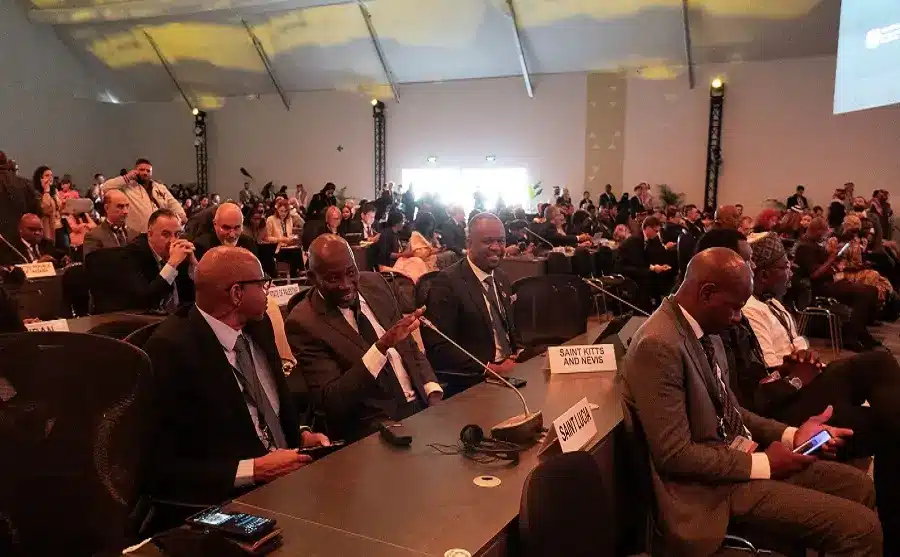The 16th Session of the United Nations Convention to Combat Desertification (UNCCD COP16) is currently underway in Riyadh, Saudi Arabia. This global gathering, taking place from December 1 to 13, brings together participants from around the world, including ministers, diplomats, technocrats, representatives from non-governmental organisations (NGOs), and members of civil society. The discussions focus on critical issues such as land degradation and drought, intending to reach a consensus on strategies to alleviate national, regional, and global challenges and achieve a sustainable future.
The global dialogue also explores cross-cutting themes such as forced migration due to drought, gender equality, and agricultural land tenure systems, aiming to generate sustainable solutions. Despite being one of the three major Rio Conventions, the UNCCD continues to struggle with limited visibility, even as it addresses issues of equal importance. Key topics under discussion include drought resilience, land degradation indicators and performance, youth engagement, gender roles and empowerment, and the impact of sand and dust storms, particularly the Saharan dust affecting the Eastern Caribbean region.
Additionally, recent reports have indicated that OECS Member States are facing dryer spells. A report on Climate Trends and Projections for the OECS Region states that drought impact potential is expected to rise because of higher evapotranspiration rates brought about by higher temperatures. The report also highlights a correlation between moderate to strong El Niño events and the occurrence of impactful droughts in the region. For instance, significant droughts during 2009-2010 and 2014-2016 coincided with strong El Niño phases.
During the opening ceremony of COP16, hopes were expressed that this COP will yield decisive action on drought, which would be especially welcome given the projected decrease in annual precipitation and increase in drought conditions driven by climate change in various regions of the world.
Poised to be the largest and most impactful COP to date, the Organisation of Eastern Caribbean States (OECS) Commission is participating in the event with support from the OECS Integrated Landscape Management (ILM) Project and delegate nomination by Saint Lucia’s Ministry of Agriculture, Fisheries, Food Security, and Rural Development. Representing the OECS Commission are Mr. Chamberlain Emmanuel, Head of the OECS Environmental Sustainability Division; Mrs. Delamine Andrew-Williams, Senior Technical Specialist on the ILM Project; and Mrs. Farzana Yusuf-Leon, Project Manager and Water Resource Specialist.
As this marks the Commission’s inaugural participation in the UNCCD’s COP, the OECS will host three critical side events featuring panel discussions and presentations aimed at highlighting the region’s vulnerabilities and the Commission’s contributions to advancing the Convention’s objectives. Under the Environmental Sustainability Division, the ILM Project supports OECS member states in tackling land degradation, enhancing productivity, and addressing challenges at the nexus of land development and watershed resources.
With ambitious goals, Ministers and technical delegations from across Latin America and the Caribbean region are in attendance to join the global alliance in tackling this issue. Delegates from the OECS Member States include Honourable Lennox J. Andrews, Minister for Economic Development, Planning, Agriculture and Lands, Forestry, Marine Resources, and Cooperatives in Grenada; Honourable Konris Maynard, Minister for Public Infrastructure, Energy and Utilities, Domestic Transport, ICT, and Posts in St. Kitts and Nevis; and Honourable Alfred Prospere, Minister of Agriculture, Fisheries, Food Security, and Rural Development in Saint Lucia.
The OECS Commission team is also providing technical support to the Partnership Initiative for Sustainable Land Management (PISLM), a political coalition under the UNCCD aimed at combating land degradation in the Caribbean. This includes reviewing and analysing negotiation texts to identify sustainable solutions and contributing to strategic work programs, potentially paving the way for future global legally binding agreements.


